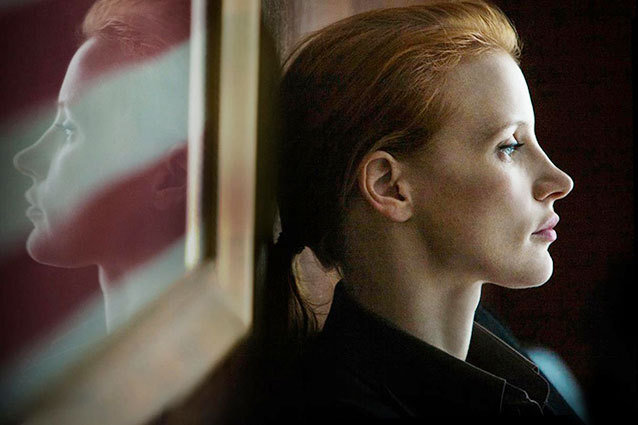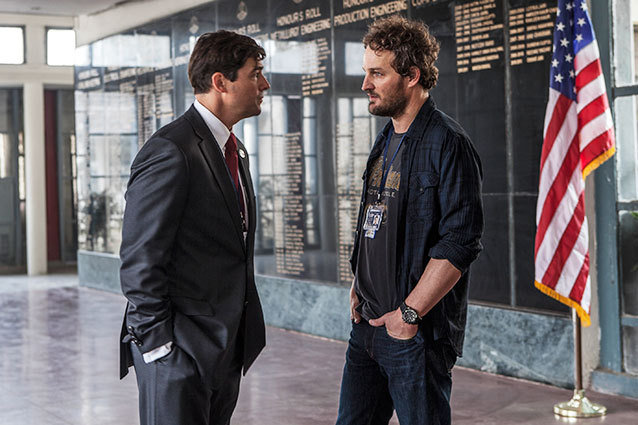
“Too soon!” It was a literal cry that rang out when trailers for Paul Greengrass‘ United 93 — an unflinching dramatization of the events that unfolded aboard the hijacked United Airlines flight that crashed in Pennsylvania on September 11, 2001 — played in theaters. As Newsweek reported, the response to the preview was so upsetting to movie patrons in New York City, that it was pulled from certain theaters. The Oscar-nominated United 93 was released in 2006, five years after the tragic events of 9/11, but for many, the nerve of that terrible day in American history still felt too raw.
While United 93 was a cinematic achievement (it has a staggering 91% on Rotten Tomatoes), the hard-to-stomach drama only made $31 million at the domestic box office. That same year, Oliver Stone‘s notably less critically beloved World Trade Center did better at the U.S. box office, bringing in $70 million. But, with the exception of Michael Moore‘s anti-Bush administration documentary Fahrenheit 9/11 in 2004 (the Palme d’Or winner made $222 million worldwide), no post-9/11 narrative film has been able to appease both wary critics and audiences alike.
RELATED: ‘Zero Dark Thirty’ Takes Top Honors At 2013 Writers Guild Awards
They have either been too divisive (Reign Over Me, and, of course, Stephen Daldry‘s 2012’s unexpected Best Picture nominee Extremely Loud and Incredibly Close, which earned just $31 million at the box office and has a 47% rating on Rotten Tomatoes, where it’s described as “treacly and pretentious”) or too exploitative (see: Robert Pattinson’s Remember Me) in the past decade to accomplish that. Leave it to Kathryn Bigelow — who turned a suspenseful, if uneasy film about the Iraq War into a Best Picture winner (The Hurt Locker) — to turn the tables once again.
Just 17 months after the killing the al-Qaeda leader, which executed the attacks on America on 9/11 Osama bin Laden, Bigelow’s Oscar-nominated Zero Dark Thirty was released. To date, it has made over $88 million, was one of the best critically received films of 2012 (it wound up on over 200 Top 10 lists), not to mention one of the most talked-about and debated films in post-9/11 cinema.
Paul Dergarabedian, Hollywood.com’s box office analyst, says the reason why Zero Dark Thirty has clicked with audiences and has the potential to cross the $100 million mark is actually quite simple. “I think because of what this event is and what it represents — the capturing and killing of bin Laden — is one of redemption, of national pride, of hope for the future,” he says. “Movies that were related to an unresolved issue and how it effected the U.S., that’s not escapist entertainment.”
“But, in its most pure form, Zero Dark Thirty is [about] escapism and redemption and validation,” Dergarebedian adds. “I think that’s why it’s doing so well and I think the timing for this is better. It’s been over a decade, there is enough time and space between 9/11 … I think Zero Dark Thirty is just the right movie at the right time.”
RELATED: Kathryn Bigelow’s Oscar Snub
Maura Spiegel, a professor of American Studies and English at Columbia University, who agrees that Zero Dark Thirty touched on the wish fulfillment aspect of our collective movie going psyche, adds, “We are pretty hungry to understand this war and understand who these people are. To me, one of the primary differences between this story of bin Laden, and 9/11 is that we’re not grieving bin Laden’s death. The sense that this was an American victory story, as opposed to a tragedy.“
But the sense of closure that came with bin Laden’s death in the chapter of 9/11 history (Spiegel noted that the film fed some moviegoers’ “hunger to see” the actual killing of bin Laden) wasn’t just what made Zero Dark Thirty a must-see film. Bigelow’s action drama, which stars Oscar nominee Jessica Chastain as a CIA operative relentlessly tracking down bin Laden, has been plagued by controversy. (The film has been under investigation by the Pentagon and the Senate Intelligence Committee.) Those very discussions allowed moviegoers and critics alike to face big, if not unanswered questions. As Spiegel puts it, “Movies about subjects like this are quite preoccupied with questions: Who is the enemy and who are we?”
Author, theorist, and chair of the Philosophy of Education in the Graduate School of Education and Information Studies at UCLA, Douglas Kellner, who had a hard time getting past the torture sequences and calls the film a “very uncomfortable experience,” says that unlike the Vietnam War era — which had “very little footage of the war and it usually came in days after the event” — this post-9/11 world consumes media differently. “All the media, cable news channels, the Internet, blogging, YouTube — [with] all of this media talking about current politics, there’s just mega-interest in contemporary history and people knowing about these events like the killing of bin Laden,” Kellner says.
NEXT: Are the torture scenes too soon or just too much?

“I think audiences want contemporary history, whether its political or social. I think people are ready,” Kellner adds. “They see so much through the Internet and television and social networking that they’re ready for Hollywood to jump right in. I think people are intrinsically patriotic, but if you overdo it and sentimentalize it, it’s corny. However, if you do it well … it definitely works.”
Don Mann, a former Seal Team Six member and training officer and author of books like Inside Seal Team Six and the recently released Hunt the Scorpion, loved the film and praises it for allowing the public to see what Seam Team Six is like without putting the team’s identity in harm’s way. Mann appreciates that Zero Dark Thirty gives viewers an unprecedented look into government and armed forces, particularly the CIA and the SEALs. “I really thought for a Hollywood movie, and we’ve had some pretty bad Hollywood SEAL movies like Navy Seal, they did an incredible job,” Mann says before adding, like so many others, “Except for those torture scenes.”
RELATED: ‘Zero Dark Thirty’ Controversy Continues
According to Mann, the brutal scenes were “grossly over-exaggerated.” And those scenes are hindering some audience members’ ability to truly enjoy the film. “There’s still a debate going on about torture and about how to deal with terrorism,” Kellner says, echoing Spiegel, who says, “The representation of the torture raised questions for me”). So while Zero Dark Thirty may have avoided the post-9/11 pitfall of feeling “too soon,” perhaps the open wound of the topic of torture didn’t. How do we come to terms with that dark page that is still very much open? (Not being able to answer that question, or not providing an easy answer for it, could explain Bigelow’s otherwise inexplicable Best Director snub).
Still, if anything, that raging debate and those very moral questions that it has raised has only made Zero Dark Thirty the water cooler film it’s become. “Like they say, there’s no such thing as bad press, and it’s pretty much true, particularly in this case,” Dergarabedian points out. “At the end of the day, the numbers don’t lie and the fact that a movie based on this subject matter is doing so well proves not only what an important movie it is, but what a good movie it is.”
Follow Aly on Twitter @AlySemigran
[Photo Credits: Columbia Pictures]
From Our Partners: Happy 25th, Rihanna: 25 Naked Pics to Celebrate (Vh1)
Happy 25th, Rihanna: 25 Naked Pics to Celebrate (Vh1) 33 Child Stars: Where Are They Now? (Celebuzz)
33 Child Stars: Where Are They Now? (Celebuzz)


